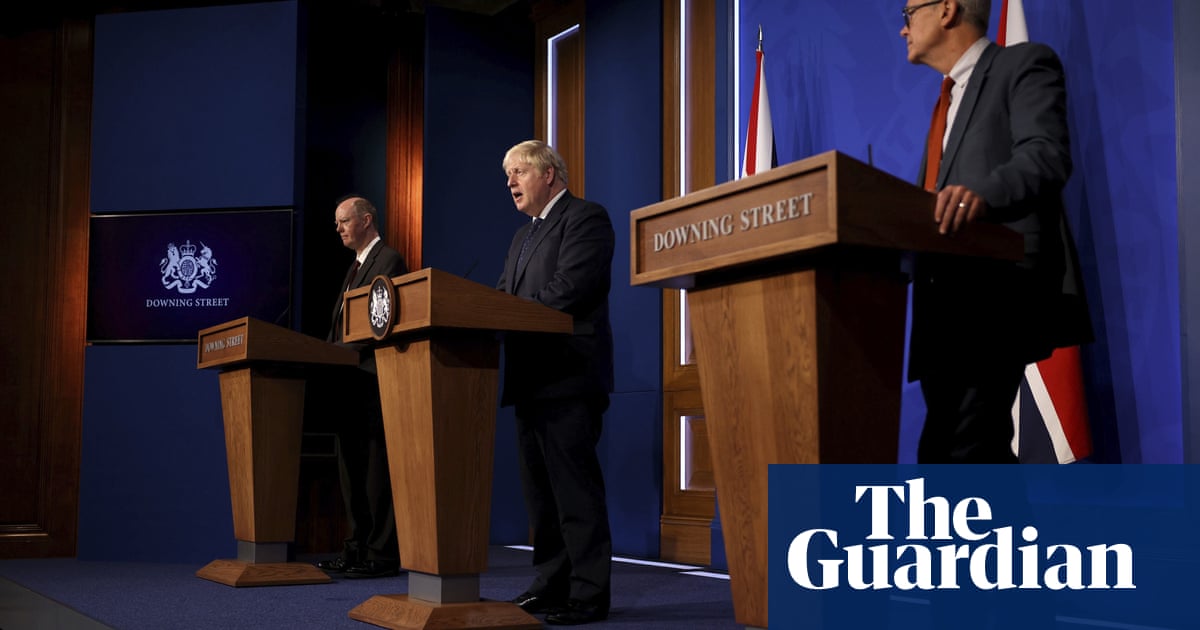
Government scientific advisers have urged ministers to bring in a “basket of measures” soon or risk daily hospitalisations soaring to between 2,000 and 7,000 next month as the new school term and returning office workers threaten to drive up cases of Covid.
Modellers on the Sage committee expect cases to rise in the coming months as people start to mix more freely, documents show. Daily hospitalisations could plausibly peak at 7,000 in England next month, far surpassing the winter peak which reached 4,500 UK-wide, according to updated modelling.
But if enacted early enough, before a rise in cases becomes sustained, – even light-touch measures could be sufficient to keep infections flat and prevent a damaging fresh wave of hospitalisations, the Sage documents say.
“With the current levels of high prevalence combined with unknown behaviours, the burden on health and care settings could rise very quickly,” the scientists warn. They say “it could be a very difficult winter ahead” if acute Covid combines with other pressures such as long Covid, other infections such as flu, or co-infection causes more serious illness.
Even though 81% of UK adults are double-jabbed, nearly 6 million are unvaccinated and vulnerable to the highly-transmissible Delta variant now most Covid restrictions have been lifted.
According to the Sage document, the modellers expect R – the number of people an infected person typically infects – to rise from about 1 in England to between 1.1 and 1.5 with schools reopening and people returning to work. If so, daily hospitalisations could peak at between 2,000 and 7,000 in October, respectively. More extreme scenarios that project many more cases are highly unlikely, the modellers add, without substantial waning of immunity or a new variant emerging.
The recommendations were published as the government announced contingency measures for the autumn and winter including mandatory mask-wearing, vaccine passports and a return to advice to work from home – while declining to implement them immediately.
The chief scientific adviser, Sir Patrick Vallance, appearing alongside the prime minister at a Downing Street press conference, stressed that experience of battling the virus around the world showed the importance of acting early.
“The principles, which have been really clear are, when you make a move you have to go earlier than you think you want to, you have to go harder than you think you want to, and you have to have the right geographical coverage,” he said.
He said the UK was now at a “pivot point” where, if the situation worsens, it could do so rapidly.
The Sage group propose “a basket of measures” they believe are light enough to keep the epidemic under control if brought in soon enough. They include more mask-wearing, encouraging continued home working, clear messaging about the remaining risk of catching Covid, more widespread testing, and a return to requiring all contacts of cases to self-isolate.
The scientists are concerned that if ministers wait until cases take off, such light-touch measures will fail and more severe restrictions will be needed to bring the epidemic – and rising hospitalisations – back under control.
A consensus document from the modellers, written on 8 September, says that rather than the sharp peak anticipated at the end of the summer, hospitalisations could peak next month and remain high into the winter.
The scientists warn that hospital occupancy in England only has to rise two and half times to reach last winter’s peak. In Scotland, it only took two weeks for hospital occupancy to double after schools went back.
The scientists add there is a “clear consensus” that high levels of home working played a major role in keeping the epidemic under control in recent months, and warn: “It is highly likely that a significant decrease in home working in the next few months would result in a rapid increase in hospital admissions.
“If enacted early enough, a relatively light set of measures could be sufficient to curb sustained growth.”
Asked at Tuesday’s press conference when tougher restrictions may need to be implemented, the prime minister said: “Just bear in mind what we’re trying to prevent, which is the overwhelming of the NHS, and that will remain our objective.”
The chief medical officer for England, Prof Chris Whitty, appearing alongside the prime minister, stressed the pressures the NHS is already under. “We are entering the winter with this reasonably high level; it wouldn’t take many doubling times to get into trouble; and therefore people still need to take this disease very seriously,” he said.
Source: Guardian







